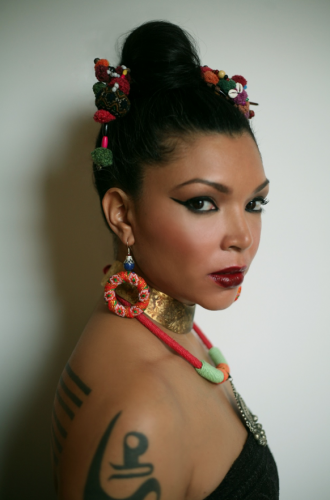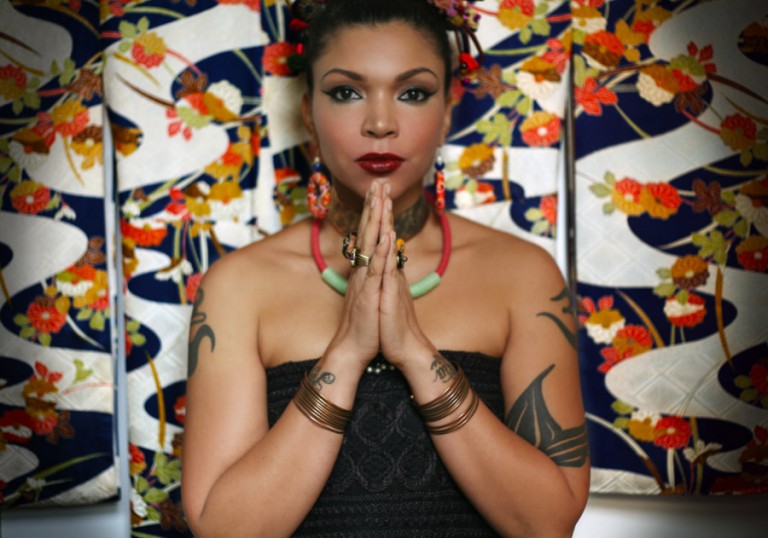Ifé Sanchez Mora, known onstage as just Ifé, is a NY-based singer, songwriter, and Nichiren Daishonin practitioner. A Detroit native, Ifé pulls from a wide variety of musical influences, including those from her Mexican and African heritage as well as American blues, rock, and soul music, seamlessly melding them into her own distinctive sound. (You can give her music a listen February 5, when her new album Fire Inside of Me is released.) Ifé, born into the Nichiren Buddhist tradition, became comfortable with her own voice through chanting practice, and her deep connection to Buddhism inspires and influences her music to this day. Tricycle’s Alex Caring-Lobel spoke with Ifé over the phone about the essence of Nichiren and Soka Gakkai, the influence of her practice on her career, and the importance of community.
Could you begin by speaking a bit about the tradition of Buddhism that you practice?
It’s called Nichiren Daishonin Buddhism—Nichiren was a 13th century Japanese Buddhist monk. I belong to an organization called Soka Gakkai International. My parents were Buddhists when I was born, and so I grew up in the practice. It’s my spiritual foundation, from the time I was very small up until present day.
We chant Nam-Myoho-Renge-Kyo, and it’s quite a bit different from Zen Buddhism or Tibetan Buddhism. This particular practice, when it first came to the United States, was brought with the Japanese women who were married to the GIs who came back after the war. It was founded with these women, but also with a lot of jazz musicians, which is how my father and my mom, both jazz musicians, started practicing.
Nichiren seems like a good fit, as a musician and singer. Do you find that to be the case, with the tradition’s emphasis on chanting?
I do agree with you. The chanting, as opposed to meditating, has helped me as a singer to be comfortable with expression with my voice. In the chant that we do, Nam-Myoho-Renge-Kyo, Kyo means sound or vibration, or action, and so we chant as a way to connect with the vibration of the universe. Singing, as you know, is a vibration; music is a vibration, so they definitely go hand in hand.
Does the chanting you practice resemble a form of meditation, or would you consider it closer to prayer? Or is it a thing totally distinct unto itself?
It’s all of the above, actually. It’s meditation when you chant, because as Nichiren Daishonin practitioners, when we’re really trying to conquer an obstacle we chant for a really long time—an hour, two hours, a day. I’ve chanted up to ten hours a day. And when you chant that long, you go into a very deep meditative state. You start to perceive everything around you in a different way, almost in a more enlightened way. And it is also prayer, because we are praying to achieve things that we desire.

Like what?
The basis of our practice is to chant for world peace, but we are also encouraged to chant for the things we want in life: happiness and health and success, or even smaller goals that we want to achieve. In regard to other people, we chant for their happiness, and that’s really key within our practice as well.
Nichiren also focuses more on the Buddhahood within yourself and chanting toward activating that Buddhahood. Through your practice you’re able to recognize and activate everyone‘s individual Buddhahood, because we believe that everyone is a Buddha and that everyone has the Buddha nature within them.
Nichiren seems to be a somewhat misunderstood tradition in the US by non-Buddhists and fellow Buddhists alike. Do you regularly encounter misconceptions about Buddhism in general or the type of Buddhism you practice?
Oh yeah, definitely. First, we live in the West, so most of us grew up with Western religions and a Western understanding of religion, spirituality, and spiritual practice. Eastern philosophy and Eastern religion are things that are brand new to a lot of us. But in the East, they’re used to a very diverse sort of understanding of different types of spiritual practice and Buddhism. So there is a lot of misunderstanding, and also curiosity.
People are very curious, and very drawn to the practice, and you hear a lot of people say, “It’s really what I believe anyway” or “Oh, those are my beliefs anyway.” And it’s true, because Buddhism is a very organic way that human beings are hardwired to think and feel and understand, and to perceive life and the universe. So I find that interaction with people very beautiful when I talk about my Buddhist practice.
Soka Gakkai International has a mentor in faith—Daisaku Ikeda the organization’s president—but there’s no priesthood or guru-like teachers. What does the absence of priests or gurus mean for the community of practitioners? More specifically, how does a community come together in their absence?
The community is extremely important for your practice. Like I said before, we practice for ourselves and we practice for others, and we’re all working globally. Twelve million people practice this with Soka Gakkai International worldwide, so we’re all working globally with the same mind of working for world peace.
I was a leader in our organization, a district leader. We have our organization set up with different regions, areas, and districts because it’s supposed to be easy for us to practice in our neighborhoods and communities. We’re supposed to be able to very easily go to a meeting and to be able to chant with our community of believers in our community and for our community—for it to prosper and for better resources to be able to stop violence and so on. SGI is very accessible. We have a cultural center in every major city around the world. Everywhere I travel to, I find a culture center, and I go and I chant. It’s really beautiful to have that sort of community globally.
One thing I’ve noticed about SGI and the Nichiren community at large is that they’ve been successful in fostering community, and a very inclusive one at that, whereas other branches of the Western Buddhist community often appear either fractured or strikingly homogenous. Others have had a hard time attracting followers and keeping them part of the community, ending up with a lot of people practicing by themselves in their homes or just with their families. Is there anything about Nichiren or SGI specifically that you think has been beneficial to fostering a cohesive community?
I think that community for us is part of the foundation of Soka Gakkai International, and also of Nichiren Buddhism, because Nichiren in his time was very radical, and he always stressed the importance of community and of connecting with his followers and supporting them. It’s the same with our leadership and our organization, from the president of SGI to our local community leaders; the most important role for a leader is to take care of the members. For example, if I have a district of 30 members, I have to spend a lot of time cultivating, nurturing, taking care of them, teaching them about the Buddha’s practice, and making sure that they are supported with their practice and whatever they’re going through in life. It takes a lot of energy and a lot of selflessness, but it’s worth it, because it brings so much happiness to your own life.
I also feel like SGI practitioners are very aware of wanting to spread Buddhism worldwide—I mean, it’s already worldwide, but to spread it further, to more people. We’re always consciously acting on that, by teaching people about the practice and bringing them to meetings. Because for us, this is the way that we’re going to achieve world peace. You can’t achieve world peace if you’re quietly sitting at home meditating with yourself or with your family; you have to be very engaged and active in your community and in your surroundings and with everyone you meet, talking to them about Buddhist practice and how it can change their lives, how it can bring peace to their community and to their relationships with other people. We’re taught in this practice to be constantly engaged and active, so I really think that that is why it’s rapidly growing.
What’s the influence of your practice on your career in music, or vice versa?
It’s really everything. First, I really feel that Buddhism has taught me how to have appreciation. I think for every human being, appreciation in daily life is key. Through having appreciation for everything, you’re able to expand so much as a human being, with your heart and your spirit and your mind. As a creative person especially, you really look to that expansion in order to be able to create, because the creative process is so intense. It takes a lot of digging deep within yourself and pulling things out while you don’t really know what you’re digging for or what you’re pulling out.
Buddhism opens you up and unlocks the blocks. It conquers these blocks that everyone has in their lives, whether it’s from trauma or pain or suffering, fear or insecurity. The chanting enables us to knock the blocks out of the way, and then you’re able to shine as the artist that you are, and feel your purpose deeply in what you’re creating.
Herbie Hancock has this great story about playing with Miles Davis, where Miles kept saying to him, “Don’t play the butter notes,” like, don’t play the easy notes, look for the “in-between notes” instead. For Herbie Hancock, it was hard for him to understand what Miles meant. But he chanted about it, to unblock the blocks that we can’t consciously unblock. And then when he came back to rehearsal he was able to understand this on a very profound level. He said that Miles just looked at him like “you got it, you got it.”
Thank you for subscribing to Tricycle! As a nonprofit, we depend on readers like you to keep Buddhist teachings and practices widely available.
